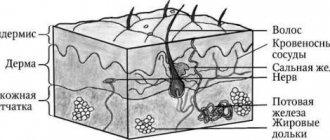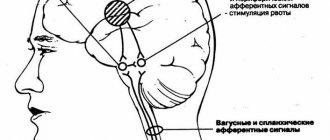Weather dependence manifests itself not only in people with mental disorders, but also in many completely healthy people. Every person knows that incredible surge of strength that occurs when the weather is clear outside. And also the opposite feeling - a feeling of drowsiness and apathy
in cloudy weather.
However, there are cases when a person is subject to the weather beyond all measure, beyond reasonable limits. In these cases, they say that the person has developed meteoneurosis
. Let's try to figure out whether this is really a mental disorder or is it a common thing that should not be considered a deviation from the norm.
Meteoneurosis and weather dependence - what's the difference?
As mentioned above, many people feel very unwell during bad weather. This is especially evident during a sharp drop, change in atmospheric pressure and, of course, during so-called “magnetic storms”. The largest group of people at risk are those patients who suffer from diseases of the nervous, musculoskeletal, cardiovascular and digestive systems.
Thus, in patients with severe hypertension, during the passage of various cyclones, the approach of a hurricane or solar flares, the pressure rises greatly. During the same period, ulcer sufferers experience stomach problems. But it is especially difficult for people who have suffered meningitis in the past. During any of the listed natural phenomena, such patients suffer from severe headaches. Patients with arthritis also do not stand aside; their weather dependence manifests itself through terrible pain and aches in the joints.
In fact, the development of weather dependence as a psychiatric diagnosis begins only when weather changes begin to influence the exacerbation phases of real-life somatic diseases.
Weather dependence is called the sixth sense
First, let's dispel the doubts of skeptics. Weather sensitivity is not an invention of muslin young ladies. This has been confirmed by science: in people who are sensitive to weather changes, the level of leukocytes in the blood increases on such days. And medical statistics have recorded: more than 60% of city residents over 28 years of age react to bad weather. The proportions are as follows: there are one and a half times more representatives of the fairer sex who sense the approach of an atmospheric front than the stronger sex.
Young children are distinguished by the most subtle sensitivity. Mothers of infants notice that babies begin to cackle as soon as the weather changes.
Meteoneurosis - disease or simulation
Let's look into this burning issue. Most people consider meteoneurosis to be an ordinary simulation. In most cases, the reason for doubt is that it is impossible to provide real evidence of a connection between weather changes and exacerbations of diseases.
As an example, let's consider a patient suffering from arthritis. With sudden changes in the weather, such a person’s joints begin to ache, they literally begin to twist, but the X-ray images do not show a single hint of any changes. Now let's look at another case. The patient complains of terrible pain in the head and painful cardiac compression, but again, neither an ECG nor a cardiogram can confirm this. Moreover, both devices show excellent data, and the pressure is also normal. And the last case. The patient complains of nausea and twisting in the abdomen, but the best gastroenterologists examine him and cannot identify any pathologies.
Having familiarized yourself with such cases, you might think that meteoneurosis is ordinary laziness and simulation. But, alas, not everything is so simple. Psychotherapists and psychiatrists unanimously assert that in reality, weather dependence is a manifestation of the disease at the psychological level. Recently, meteoneurosis has been officially considered a disease and is recognized by medical communities in almost all countries of the world.
It turns out that the reason for this condition is connected with the person’s subconscious - just as it happens with any neurosis. The answer to possible relief from meteoneurosis lies not in all kinds of tests, but in the head. Let's consider this picture: in childhood, a child saw one of his parents complaining about poor health, which was allegedly associated with a change in weather, and the child's brain retained this event, the cause-and-effect relationship was deposited in the subconscious. It turned out to be a kind of stereotype that any sudden changes in weather should lead to poor health, laziness and apathy
.
Manifestations of weather dependence
Patients with diseases of the bronchi and lungs, asthmatics, arthritis sufferers, and hypertensive patients can accurately predict bad weather. If the temperature outside the window and atmospheric pressure immediately decrease, they expect their condition to worsen, complaining of pain in the joints and stiffness in movement.
Cores can compete with the hydrometeorological center in the accuracy of forecasts. A couple of hours before the weather changes (and it could even be a change in the direction of the wind), they complain of headaches, weakness, anxiety, joint pain, and angina attacks. The hardest days for them are those with high air humidity and when a thunderstorm is approaching.
Heart crises, as ambulance workers note, occur at times of pronounced activity of the geomagnetic field and magnetic storms. A sick heart also reacts to periods of high sun activity.
The state of health these days deteriorates in those suffering from vegetative-vascular dysfunction (previously this disease was called vegetative-vascular dystonia), gastritis, patients with pneumonia, pyelonephritis, eczema. People with mental problems have another influencing factor - lunar tides.
In principle, any chronic responds to bad weather, doctors say.
How to deal with meteoneurosis?
In most cases, ordinary doctors cannot help with meteoneurosis. The trouble is that the cause of unpleasant sensations is not in diseases of the organs, but in psychology, in the subconscious. Need help from a psychiatrist or psychologist. Visits to “regular” doctors only aggravate the situation and lead to even greater apathy
.
A psychotherapist or psychiatrist will help you understand the psychological conflict that caused meteoneurosis. After an appropriate course of treatment, symptoms may significantly weaken and, in some cases, disappear altogether.
It is also known that there are ways to independently relieve the symptoms of weather dependence. In particular, the patient should exercise regularly and follow a daily routine, as well as regularly and a lot of walks in the fresh air. Gradually, the intensity of physical activity must be increased - it is they that contribute to the normalization of the autonomic nervous system.
Why do vessels feel the wind?
And how are rain and the heart connected? Many situations are explained by elementary physics and simple physiology. Thus, when atmospheric pressure drops, the pressure in the vessels decreases and the speed of blood flow decreases. Gases form in the intestines. They expand the abdominal cavity and accordingly raise the diaphragm, the result is that it is difficult to breathe, the heart and blood vessels experience a lack of oxygen. If the atmospheric pressure rises, then the pressure in the vessels increases accordingly and the speed of blood flow increases, which also causes discomfort.
When there is a strong wind, it is more difficult for us to breathe - and the oxygen content in the blood naturally drops. Also, degrees outside the window and changes in atmospheric pressure affect the activity of some enzymes. Scientists say that in anticipation of an upcoming downpour, hail, hurricane, pressure surges or sudden warming or cold weather, a person’s defense system is triggered: hormonal levels, enzyme activity, platelet content and blood clotting indicators change.
But in principle, one cannot talk about the influence of one weather factor. As a rule, they act together on our well-being. And you can derive such formulas. Cold wind plus high atmospheric pressure equals excess oxygen and vasospasm. Low atmospheric pressure plus high humidity, high (or low) temperature equals a lack of oxygen and heaviness in the head.
Manifestations of weather dependence include fluctuating blood pressure, rapid pulse, shortness of breath, fever, sleep problems, dizziness, headaches, joint pain, cramps, weakness, fatigue, apathy, drowsiness, chills, bad mood, absent-mindedness, and memory problems.
The most critical situations for a weather-dependent person are a sharp drop or rise in atmospheric pressure, a temperature difference outside the window of 8 degrees or more for 48 hours. But in fact, there are no more than two dozen truly difficult days for well-being a year. Once every five to six days a person may react to the weather with a slight deterioration in health.
Glossary of terms
In this section we have collected all the terms that you might encounter in this article. Gradually, we will collect from these explanations a real dictionary of a narcologist-psychiatrist. If some concepts remain unclear to you, leave your comments under the articles on our site. We will definitely help you figure it out.
Apathy
- a state of indifference and indifference towards everything in the world.
Emotions do not manifest themselves at all or are manifested weakly, the patient does not strive for any activity, his volitional activity decreases ( apato-abulic syndrome
).
So what should you do if you feel like the weather is having a big impact on you?
Try keeping a journal of how you feel. If deterioration occurs, write down what exactly hurt, what the weather was like at that moment and other factors that you consider important. Then, after analyzing the data for a more or less long period, you will be able to predict in advance an attack of poor health, which means taking preventive measures. In addition, such a diary will become an invaluable source of information if you decide to see a doctor.
Hardening, physical activity, proper nutrition - all this will be good prevention. Try to get a good night's sleep. You can add chamomile, mint to tea, brew rose hips, or resort to other soothing and relaxing remedies. It is also better to give up alcohol and limit the amount of coffee, tea and other stimulants.
How to reduce weather sensitivity, weather dependence
If we are talking about chronic patients, then first of all - treat the underlying disease and drug prophylaxis in cases of unfavorable weather forecasts. Therapeutic physical training, hardening with air and sun baths, and regular outdoor recreation are very useful. Pine baths are effective and can be easily prepared from pine extract at home. Their duration is 10–15 minutes, water temperature is 35–37 degrees, the course of treatment is 12–15 procedures. It is also difficult to overestimate the importance of a healthy lifestyle , avoiding such risk factors as smoking. All this contributes to better adaptation of the body to changing climatic conditions.
It is not always possible to completely remove meteosensitivity, but the reactions can be significantly alleviated.
Head of the prevention department Merchi-Rezanovich Lyudmila Sergeevna
Weather sensitivity in adults and children: who is at risk
During evolution, the human body has learned to adapt to changes in weather conditions. If the weather situation changes evenly and insignificantly, healthy people, as a rule, do not notice it. Persons suffering from chronic diseases are a different matter. In this case, in response to changes in weather conditions, a person may experience a pathological (meteotropic) reaction. By the way, if earlier experts believed that mainly older people suffered from weather sensitivity, in recent years they have recorded a significant “rejuvenation” of the disorder. This is associated with acceleration (accelerated development of the body) of modern people. In addition, some researchers suggest that this disorder may be hereditary, and it is also worth remembering the meteosensitivity of infants.
As observations show, the level of manifestation of meteosensitivity depends on various factors:
- age and gender of the person;
- form and stage of the disease (chronic);
- type of nervous system;
- level of adaptive capabilities of the body.
It is known that residents of different climatic zones may have their own characteristics and manifest themselves in different ways. A weather-sensitive person does not necessarily react to all the vagaries of nature (changes in atmospheric pressure, magnetic storms, humidity, etc.); only one of the factors can cause deterioration in well-being, while others go unnoticed by the body.
Recently, researchers have become seriously interested in the impact of meteorological factors on human sensory organs (vision, hearing). It turned out that visual weather patterns (clouds, rain, rainbows, etc.) can influence the external behavior (actions, speech) of a weather-sensitive person. While auditory meteorological images cause changes in internal behavior (thinking, motivation, imagination, faith). Interestingly, a person can perceive weather sounds at a distance of more than 50 km from the source.










